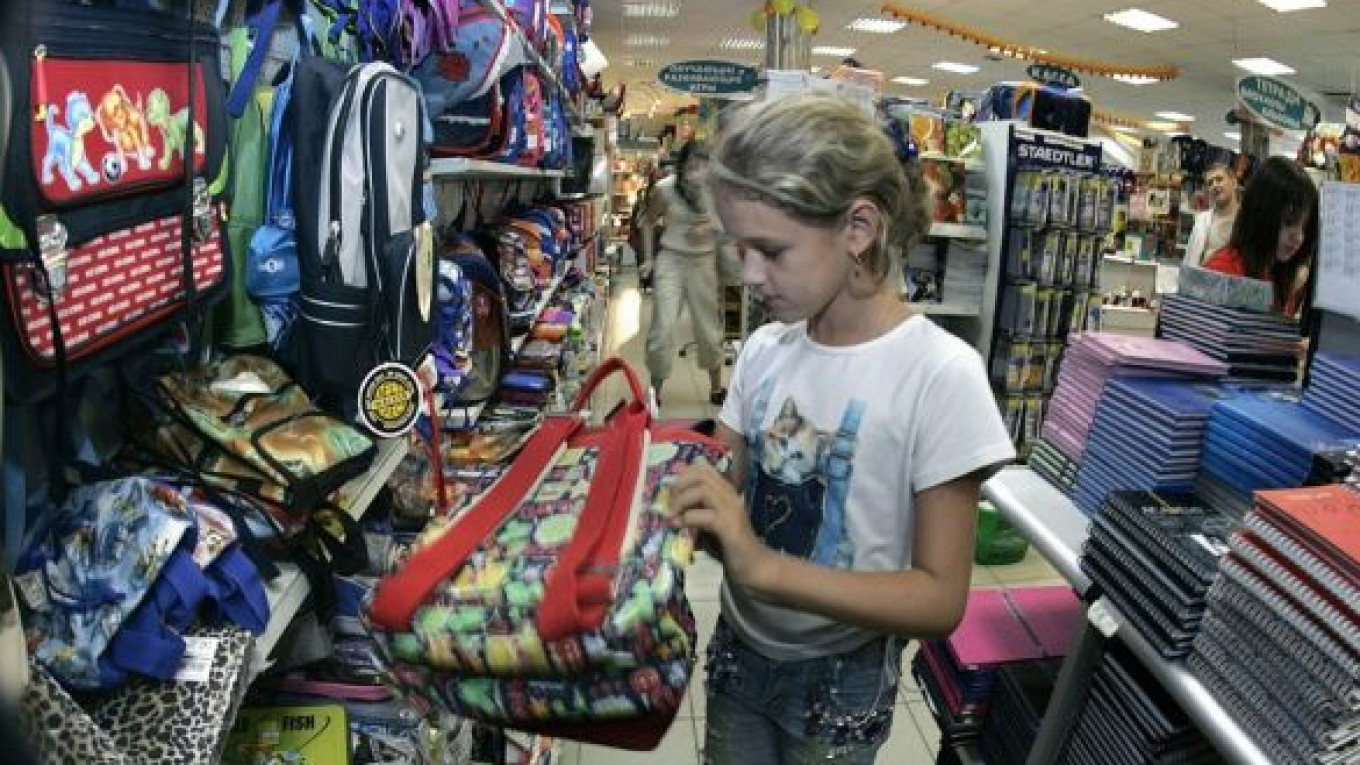The Industry and Trade Ministry wants to increase the share of locally made children's products on the domestic market from 20 percent in 2012 to 45 percent by 2020, Deputy Minister Viktor Yevtukhov said at a news conference Tuesday.
Russia has over 1,200 companies that manufacture children's products and have 20 percent of the market, which reached nearly 700 billion rubles ($21.6 billion) in total last year. With 10 percent annual growth, it is one of the fastest growing sectors in the country.
Left to develop on its own for many years, the segment is now getting more attention, especially with the recent improvements in demographics.
"It's a powerful market in Russia, which is why it is so interesting, primarily for Western producers. But we very much hope that through this strategy we can first of all really help our domestic manufacturers," Yevtukhov said.
Prime Minister Dmitry Medvedev approved the strategy charting the development of the children's products industry in June, and the specific program of action is expected to be confirmed by the end of the year, Yevtukhov said. The list of priority investment projects would be announced on Sept. 24 at the Mir Detstva exhibit in Moscow, he added.
The strategy outlines the facets of a public-private partnership in which the government will give funds to support Russia-based manufacturers of children's products. The government will allocate approximately 4 billion rubles to implement the program for its first two years. Yevtukhov said he expected companies to match these investments from their own budgets.
The government is particularly keen to make children's products more innovative, so the strategy envisions creating several technology parks, an innovation cluster and a center of industrial design. Innovative children's products include backpacks that have posture-friendly designs and clothes that don't let in UV rays.
The government will also help to fund the expansion of existing manufacturing facilities and create new lines of mass-produced children's goods. Some of the segments where Russia is best able to compete with foreign producers are children's shoes, furniture and books, said Antonina Tsitsulina, president of the Association of the Child Products Industry.
Foreign investors are eligible to receive state support if they manufacture their products locally and their plans are deemed to be economically viable.
"We are expecting to have partnerships with foreign players in a number of projects, especially the high tech ones," Tsitsulina said. "We are interested in foreign investors who won't oppress or replace Russian manufacturers, but will invest their technologies and their resources into the development of high tech production in Russia."
The implementation of the strategy could also indirectly help control the prices for children's products in Russia, Yevtukhov said. Russian-made products currently cost more than those from Ukraine and Poland, not to mention those from Asian countries.
Contact the author at e.smirnova@imedia.ru
A Message from The Moscow Times:
Dear readers,
We are facing unprecedented challenges. Russia's Prosecutor General's Office has designated The Moscow Times as an "undesirable" organization, criminalizing our work and putting our staff at risk of prosecution. This follows our earlier unjust labeling as a "foreign agent."
These actions are direct attempts to silence independent journalism in Russia. The authorities claim our work "discredits the decisions of the Russian leadership." We see things differently: we strive to provide accurate, unbiased reporting on Russia.
We, the journalists of The Moscow Times, refuse to be silenced. But to continue our work, we need your help.
Your support, no matter how small, makes a world of difference. If you can, please support us monthly starting from just $2. It's quick to set up, and every contribution makes a significant impact.
By supporting The Moscow Times, you're defending open, independent journalism in the face of repression. Thank you for standing with us.
Remind me later.






